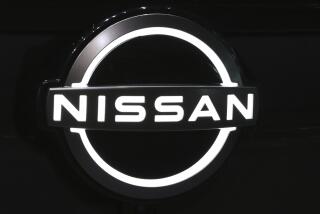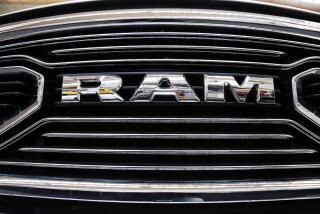Takata pleads guilty to fraud in air bag case involving 16 deaths
Japanese auto parts maker Takata Corp. has pleaded guilty to a criminal charge and agreed to pay $1 billion for a scheme to conceal a deadly defect in millions of its air bag inflators.
Takata admitted to hiding problems that can cause inflators to explode with too much force, hurling shrapnel into drivers and passengers. U.S. prosecutors still are seeking extradition of three former Takata executives from Japan to face criminal charges.
Detroit federal Judge George Caram Steeh accepted a guilty plea to a fraud charge Monday.
Takata has agreed to pay $850 million in restitution to automakers, $125 million for victims and families and a $25-million criminal fine. Separately, the company faces dozens of consumer and state lawsuits that could run into millions of dollars.
The inflators are blamed for at least 16 deaths worldwide and more than 180 injuries. The problem touched off the largest automotive recall in U.S. history, involving 42 million vehicles and 60 million inflators.
Attorneys for people who filed suit Monday against Takata and five automakers say the car companies knew that Takata’s products were dangerous yet continued to use them for years because they were inexpensive.
The allegations against Honda, Toyota, Nissan, Ford and BMW were made in a court filing Monday in Miami.
In the court filing, plaintiffs lawyers allege that the automakers were “far from innocent” in the case, and that they had independent knowledge that Takata’s air bag inflators were unsafe before putting them in millions of vehicles.
Unlike most other air bag makers, Takata uses the explosive chemical ammonium nitrate to inflate air bags instantly in a crash. But the chemical can deteriorate when exposed to prolonged airborne moisture.
“The automotive defendants were aware that rupture after rupture, both during testing and in the field, confirmed how dangerous and defective Takata’s air bags were,” the attorneys allege in the court document, called a “status report.”
After an inflator ruptured in 2009, one of the auto companies described the problem as “one in which a passenger protection device was transformed into a killing weapon,” the lawyers allege. The company was not identified in the court filing.
ALSO
Oscars mistake could prove a major blow to PricewaterhouseCoopers’ reputation
Durable goods orders jump 1.8% due to demand for military, commercial aircraft
Why the stock market has climbed to record highs despite Trump uncertainty
UPDATES:
12:50 p.m.: This article was updated with news that Takata has pleaded guilty.
This article was originally published at 7:50 a.m.
More to Read
Inside the business of entertainment
The Wide Shot brings you news, analysis and insights on everything from streaming wars to production — and what it all means for the future.
You may occasionally receive promotional content from the Los Angeles Times.









